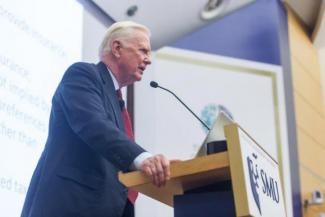
The flood of intellectually searching questions posed to Sir James Mirrlees showed just how thought-provoking his lecture at SMU had been. Various members of the diverse audience asked for his views on the imposition of a minimum wage; the diversion of money away from financial speculation to value-creation; the redistribution of wealth via charities versus taxation; and the Danish socio-economic model. SMU President Professor Arnoud De Meyer who moderated the dialogue also asked whether inequality is a spur to creativity and innovation and about Sir James’ views on the controversial work of Professor Thomas Piketty.

Sir James Mirrlees with Prof De Meyer, who moderated the Question and Answer session.
The lecture was part of the Nobel Prize Series Singapore 2015, which brought four Nobel laureates to speak in Singapore on 6 November 2015. Sir James Mirrlees, together with William Vickrey, received the Sveriges Riksbank Prize in Economic Sciences in memory of Alfred Nobel in 1996. The prize was awarded for their theory of optimal income taxation, which allowed optimal tax schedules to be calculate in realistic economic models. Sir James is currently a Distinguished Professor-at-Large at the Chinese University of Hong Kong.
His lecture at SMU attracted more than 350 guests, including members of the diplomatic community, representatives from various business organisations and educational institutions in Singapore, as well as SMU students, staff and faculty members.
He spoke on "The Causes of Economic Inequality" and discussed how the rising income inequality is becoming a major social-political issue across the world. He began by citing a study released by the anti-poverty charity Oxfam earlier this year, which said that based on current trends the wealthiest 1 per cent will own more than 50 per cent of the world’s wealth by 2016. However, he said that we should focus more on wealth inequality rather than income inequality and take into account investment, assets, and family inheritance. He suggested that economic inequality has an impact that goes beyond the sphere of economics: the degree of inequality affects how political power and how society’s welfare are distributed, which can therefore prompt governments to intervene.
“The rich can buy influence, in varying degrees, depending on country or individual,” he said. “America is a notorious case... where it’s possible to obtain considerable influence just by being rich.” He argued that Robin-Hood style taxation, which subsidises those on a low income by taxing heavily those with high income, does make a “difference” in redistributing wealth. This model seems to have worked in Scandinavian countries, such as Denmark and Sweden, which are among the most heavily taxed countries in the world, yet where some of the most creative and entrepreneurial minds thrive, he said.

Sir James received a pair of commemorative coins as a token of appreciation from Prof De Meyer.
Following the lecture, Sir James had a roundtable discussion with selected SMU faculty and students, where they further debated the issues that were raised during the lecture and Q&A sessions.
Main photo: Nobel laureate Sir James Mirrlees delivering his Nobel Prize Series Singapore 2015 lecture at SMU

At the roundtable discussion, from left to right: SMU President Prof Arnoud De Meyer; Sir James Mirrlees; Deputy CEO Nobel Media Mrs Laura Sprechmann; and Dean of the SMU School of Social Sciences Prof James T H Tang.